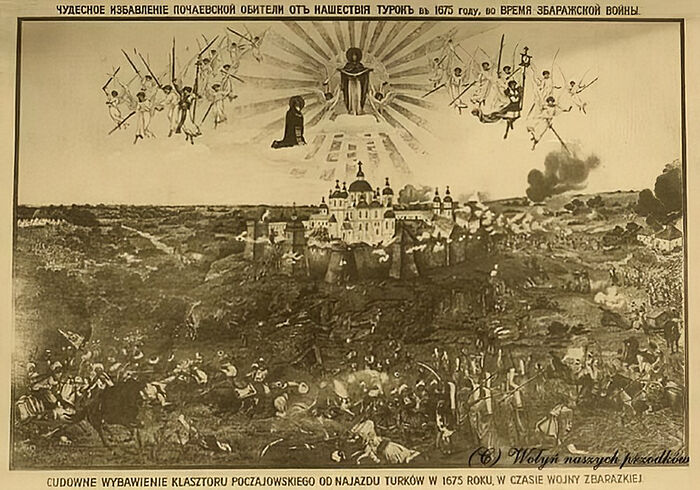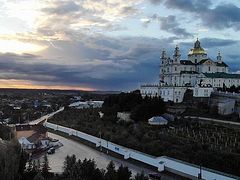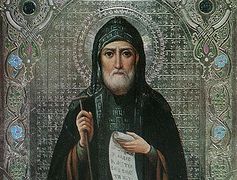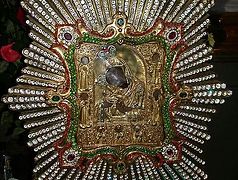This article is dedicated to my dear friend, Fr. Serhii (Chebotar’), the former choir director of Pochaev's Hierarchical Choir, who was recently tonsured a hieromonk with the name Nikolai. In 2020, Fr. Nikolai received a second double lung transplant, and is still, unfortunately, severely ailing. Prayers are very much needed, and we thank everyone who has prayed for our priest, friend, and choir master par excellence.
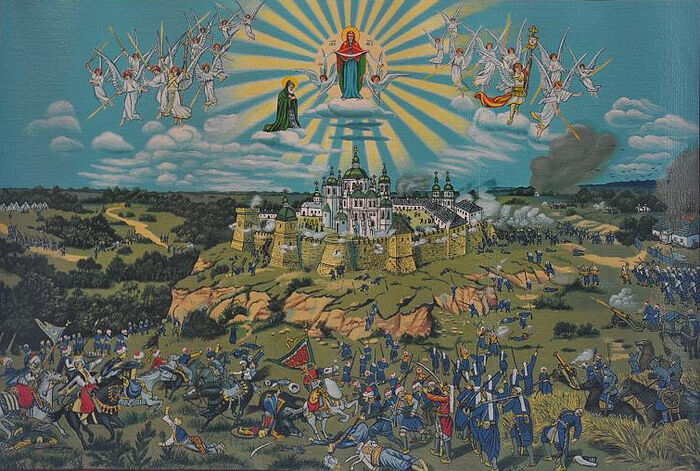 “The miraculous deliverance of the Pochaev monastery from the Turkish assault of 1675 during the Zbarazh War”. An uncommon colored version of the famous illustration by polish artist Zygmunt Vogel (1764-1826).
“The miraculous deliverance of the Pochaev monastery from the Turkish assault of 1675 during the Zbarazh War”. An uncommon colored version of the famous illustration by polish artist Zygmunt Vogel (1764-1826).
The knightly land of Volhynia has seen more than a little warfare and many great victories, but more glorious beyond compare, was the day when the Mother of God appeared in battle, and saved Pochaev from doom and despair.
In honor of the feast of the Pochaev Icon of the Theotokos, which we celebrate today, and the miraculous deliverance of Pochaev Lavra from destruction at the hands of a Turkish Army in 1675, we would like to present to you a video and translation of a famous and beautiful Ukrainian language ballad: “The Evenstar Rose over Pochaev” or in Ukrainian: Ой, зійшла зоря (oi zishla zorya).
In order to fully appreciate the events of the ballad, provided below is a brief history.
The Apparition and the History of the Polish-Ottoman War
The miraculous apparition of the Mother of God at the Holy Dormition Pochaev Lavra on July 23, 1675 (August 5 N.S.) is one of the most famous, if not the most famous Marian apparition in the lands of Old Rus', and certainly the most celebrated Marian apparition in Ruthenia, or South-Western Rus'—the modern-day lands of Ukraine, Belarus, and Carpathian Rus’.[1]
Pochaev had long been a place chosen by the Mother of God. After the fall of Kiev, the legacy of Kievan Rus’ began to shift to the west, to Galicia and Volhynia,[2] and so naturally, monks from the Kiev Dormition Lavra fled into these lands from the ruinous Mongol Invasion. In 1240,[3] they stopped at what would become Lavra Hill in Pochaev, where the Mother of God appeared to them, and instructed them to build a monastery there, and thus the tradition of the Kiev Caves would he continued in Pochaev, just as the traditions from Pochaev would be continued in Carpathia, and from Carpathia, to Jordanville, New York, forming a continuum of holy tradition. This would not be the last time the Mother of God would appear in Pochaev; she left her footprint there on a rock, which may be venerated in the Lavra’s Trinity Church,[4] marking Pochaev as being under her protection, and later invaders would learn that her might is unassailable.
Turkish Invasions
Since the fall of Constantinople in 1453, Turkish Moslem armies constantly launched aggressive invasions into other Christian lands, especially what remained of the Greek lands, Serbia, Bulgaria, and Romania, where Christians resisted bravely.
The Polish-Lithuanian Commonwealth, which included the Ruthenian lands, (Rusyns themselves making up a sizable amount of the population, including the nobility, some holding the highest ranks in the commonwealth) fought particularly valiantly against the invaders.
The famous winged hussars and countless hosts of Cossacks and Orthodox Ruthenians saved Europe more than once from Islamic subjugation. The Battle of Khotyn (1621) was among the largest and most pivotal battles in Europe between moslem and Christian armies. A young St. Peter Mohyla, the son of the Voivode of Moldova, and future Metropolitan of Kiev, was one of the polish knights at the battle, and their tremendously costly victory held back the Ottoman tide from the Commonwealth’s lands for a time.
After the death of St. Peter, which tragically ended a short golden age for Orthodoxy in Poland and in Ruthenian history, conflicts would intensify between Poles, Cossacks, Russians, Crimean Tatars, and the Ottomans.
In 1672, the war began between the Polish-Lithuanian Commonwealth, and the Ottoman Empire and their Tatar vassals. Several years into the war, in 1674, St. Peter Mohyla’s great-nephew, King Michał Korybut Wiśniowiecki of Poland died, and the Commonwealth elected Jan Sobieski as King.
The Zbarazh War and the Miracle at the Siege of Pochaev
Pochaev was besieged in 1675, as part of what is known as the Zbarazh War,[5] which is a phase of the greater Polish–Ottoman War of 1672–1676.
On July 20, 1675, a Turkish-Tatar attack force was sent against Pochaev, the cornerstone of Orthodoxy in Western Rus’, surrounding Pochaev they encompassed it about “like a black cloud”, but in the name of the Lord, they were destroyed.
Though Pochaev had Cossack guards, even if they could hold the walls, it was unlikely they could survive a protracted siege. Understanding this on July 23, the Christians turned to both their first and last line of defense—God, and began to pray for the intercession of the Mother of God.
The moment they began the Akathist, with the words of the kontakion, To Thee the Champion Leader”, just when the Turks had thought they’d won, and darkness would reign over the Ukraine, Our Lady appeared and eclipsed the evening sun.
She appeared like a red burning bush over the viridescent[6] hills of Volhynia, commanding an army of angels. The continence of her face was sorely incandescent, radiating a divine light which was gladsome to the Christians, giving them hope and joy, but at the same time terrified the enemies of God like a great tempest of fire.
It is interesting to note, that in the Church Slavonic translation of the kontakion, despite often being softened in English translations as “Champion Leader”, Our Lady is literally called “Unassailable Warlord (Voivode)”,[7] and in the Polish translation, she is called Walecznej Hetmance. The Polish is particularly worth noting, as this is essentially an unprecedented feminine form of Hetman, a title for a supreme military commander of Poland, Lithuania, or the Cossacks. Thus, the Mother of God is literally seen as the defender par excellence of not only the souls but also the bodies and the lands of Orthodox Christians, to whom Christians turn immediately after God, as she had intervened before of old.
In the apparition, St. Job of Pochaev was beside their “Champion Hetman”, supplicating her to save the monastery, and the angels stood ready to defend the holy hill and garden of the Queen of Heaven and Earth, with terrible flaming swords drawn.
Though the defenders felt a great joy fall upon them, according to tradition, a panic and madness fell over the attackers, who were terrified of the flaming apparition, which eclipsed the entire sky. Madness was the only way to describe it, as they foolishly dared to shoot at the bodiless powers themselves. The Tatars loosed their arrows, and the Turks fired their guns, but their arrows and shots flew back down at them, slaying them on the spot, and they began to rout and trample each other.
The emboldened Cossacks rallied to their Queen, to their “Heavenly Hetman”, and charged the Ottoman horde, capturing many prisoners, some of whom would come to believe in Christ, and labor for their salvation as monks in the monastery they once attacked. The remaining Turkish forces were later pushed back from Volhynia, by the victorious hosts of Sobieski from Lwów and the rest of Ruthenia.
Pochaev was saved, and the holy apparition disappeared, leaving only the evenstar shining over Pochaev.
King Jan Sobieski would, in years to come, famously save Vienna with his army of winged hussars and cossacks (one cossack among them was credited with founding the first coffee shop in Vienna). Though despite Austria literally being saved by the Slavs, it wouldn't prevent them from partitioning and occupying Poland and Galicia for centuries, where Slavs, especially Orthodox Christians suffered greatly.
Pochaev, however, remains to this day a great fortress of Orthodoxy, under the protection of its heavenly champion, leader, and even “Hetman”—the Queen of Heaven, and Ever-Virgin Mary herself.
With this knowledge in mind, we may better appreciate this knightly ballad (duma in Ukrainian).
The Evenstar Rose over Pochaev ~ Ой, зійшла зоря
Below are two videos of the ballad, the first sung in Pochaev’s new transfiguration cathedral, which is one of the largest and most beautiful churches in Ukraine, and the second video includes a dramatization of the miracle. Included is this author’s English translation of the ballad, as well as a transliteration and the original Ukrainian text.
English Translation:
Oh the Evenstar rose,
Over Pochaev it stood,
In the distance, a proud Turkish horde gathered,
encompassing the Lavra like a black cloud.
Turks and Tatars besieged the gates,
to make war on the monastery, to invade,
‘Our Lady of Pochaev will save us!’
the Christians hoped and prayed.
Father Zalilo[8] rose from his cell,
With tears he was crying:
“Save O Mother of God! Save them!
The monastery is dying!”
She came! She came! The Mother of God!
She eclipsed the sun,
She sent back their bullets, and the Turks she smote,
The monastery she saved, the Christians had won.
As Christian peoples all,
we rededicate our lives to God,
and Our Lady of Pochaev,
forever will we laud.[9]
Ukrainian:
Below is the text in Ukrainian-proper and transliterated, which was taken from this site, which also includes Polish and Russian translations.
Transliteration:
Oy, ziyshla zorya vecherovaya,
Nad Pochayivom stala,
Vystupalo turetsʹkeye viysʹko,
Yak ta chorna khmara.
Turky z tataramy bramy oblyahaly,
Manastyr zvoyuvaly,
Maty Bozha Pochayivsʹkaya
Bude nas ryatuvaty.
Otetsʹ Zalilo z keliyi vyyshov,
Ta slizʹmy umlivaye:
„Oy, ryatuy, ryatuy, Bozhaya Maty,
Manastyr zahybaye”.
Oy, vyyshla, vyyshla, Bozhaya Maty,
Na khresti vona stala,
Kuli vertala, turkiv vbyvala,
Manastyr vryatuvala.
A my lyudy vsi, khrystiyany,
Do Boha vsi vdaryaymo,
Materi Bozhiy, Pochayivsʹkiy
Poklin vsi viddaymo![10]
Original text:
Ой, зійшла зоря вечеровая,
Над Почаївом стала,
Виступало турецькеє військо,
Як та чорна хмара.
Турки з татарами брами облягали,
Манастир звоювали,
Мати Божа Почаївськая
Буде нас рятувати.
Отець Заліло з келії вийшов,
Та слізьми умліває:
"Ой, рятуй, рятуй, Божая Мати,
Манастир загибає".
Ой, вийшла, вийшла, Божая Мати,
На хресті вона стала,
Кулі вертала, турків вбивала,
Манастир врятувала.
А ми люди всі, христіяни,
До Бога всі вдаряймо,
Матері Божій, Почаївській
Поклін всі віддаймо![11]

